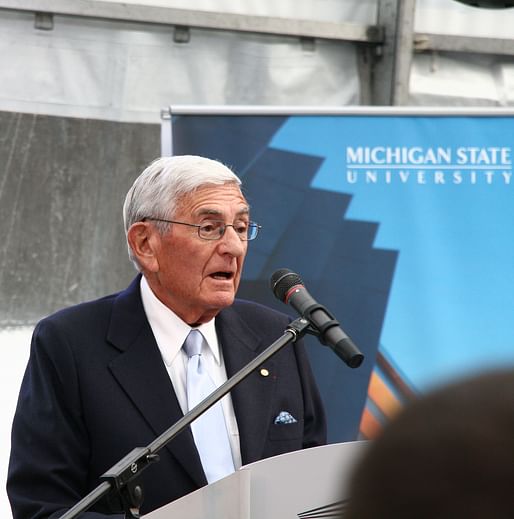

Eli Broad, a businessman and philanthropist whose vast fortune, extensive art collection and zeal for civic improvement helped reshape the cultural landscape of Los Angeles, died on Friday at Cedars-Sinai Medical Center in Los Angeles. He was 87. [...]
Mr. Broad (pronounced “brode”) made billions in the home-building and insurance businesses and spent a significant part of his wealth trying to make Los Angeles one of the world’s pre-eminent cultural capitals.
— The New York Times
Broad is best known for his extensive philanthropic work focused on public education, scientific and medical research, and the visual and performing arts. He, along with his wife Edythe, has given more than $4 billion to support these efforts. Their work has placed them among the leading philanthropists in the United States.
His lasting legacy on Los Angeles is considerable with work including the creation and preservation of the Los Angeles Museum of Contemporary Art, the creation of the Broad, a $140 million art museum that he financed himself that features his collection of more than 2,000 contemporary works, and the Walt Disney Concert Hall, in which he granted $50 million to complete the project.
In recent years, Broad has dedicated a majority of his time to his philanthropic work via his foundations, The Eli and Edythe Broad Foundation and The Broad Art Foundation. With assets of $2.4 billion, they advocate for public education reform and promote the revitalization of Los Angeles' downtown into a commercial and residential center.
23 Comments
Thanks for such a ubiquitous gift to American architecture Eli Broad. Your castles checkmated us.
wondering how many archinectors have donated 4 billion to public education, medicine, etc ? Complaining about capitalism is a far less effective means of progress than engaging in capitalism and philanthropy.
In the Netherlands we simply use taxes to pay for essential stuff everybody uses and needs such as education, medicine, culture etc. and don't rely on philanthropists that got rich by cheating the system and give back a little to the charity of their preference only because of their guilty conscience and their desire for recognition...
Turning an obituary into your personal political pedestal is pretty rude.
Yeah, it was a response to Orhans attempt to bash the guy.
Guess you missed the point
you're right tduds...if mods find it inappropriate they are welcome to delete my contribution here.
he didn't build the system, he wasn't born into wealth, and he built houses that to a nonarchitect are really nice. i don't see any purpose to criticism of the person - all he did was win a lottery by being in the right place at the right time.
he also seems like a person who maintained progressive views and genuinely loved architecture. the history of the profession is built around the names of people like this.
i view orhan's response as a contempt for vernacular building which is sadly common among architects. venturi - scott brown were brilliant in trying to question that but i think the message was mostly lost in the silliness of postmodernism.
Of course, your myopic interpretations of my comment didn't go far enough to connect, depletion of farmland through speculative single-family dwellings en masse, the nationwide proliferation of suburban gated communities, the commuting culture of the workforce, big-box retailers everywhere. Should I list more? Have you been to the Central Valley of California lately? How about growing up in a suburban spread?
He appropriated ultra-modern white houses for himself but his development company appropriated the model I roughly described above with few sentences. They had the means of developing something new and environmentally healthy but his company chose the easy money, taxing the environment. And, I am not talking about green grass around the development projects they built.
I am not talking about the benevolent man but his corporation's actions on the built (and unbuilt) environment.
And yes, he checkmated all the pawn pushers...
we see the world differently, as noted
I slightly disagree with these houses being “vernacular” though. To quote DSB, these houses are “for the people, not by the people”. People inhabit what’s available. You may love modern architecture, and surprisingly many suburban dwellers do, but good luck finding a modern home for that price. When a mid-century home for a decent price becomes available in my area it’s gone in a day. High high demand. Low low inventory. I do think builders should/could provide modern and sustainable alternatives to the KB home type dwellings. I think there is a big but silent demand for that. “If you build it they will come”
Mid-century unsustainable suburban sprawl is still unsustainable suburban sprawl. The design of the houses are inconsequential to the problem.
^sprawl itself is not inherently unsustainable. It’s just always been because of the automobile. Also depends on what we sprawl into. Obviously deforestation to build houses is unsustainable, but most sprawl in the US is overtaking farmlands (if I remember correctly). The potential to create a permaculture high tech- broad acre city-esqe type of sub-urban fabric is more promising than it seems.
Anybody know how long the flight is from LA to Chicago, from Chicago to NYC? I think Zumthor might be on a streak of architectural hit jobs.
Didn't know Z had beef with anyone, always thought he was above that sort of thing, even literally up there in his Swiss mountains...
I'm kidding. Based on stories Donna and I heard when having dinner with another famous architect.
B3ta, I'd watch that movie. Maybe Ryan Reynolds can be a supporting character.
Its not like he single-handedly started the McMansion process. One cant blame all of American Capitalism on one man.
It's a vast conspiracy.
Block this user
Are you sure you want to block this user and hide all related comments throughout the site?
Archinect
This is your first comment on Archinect. Your comment will be visible once approved.